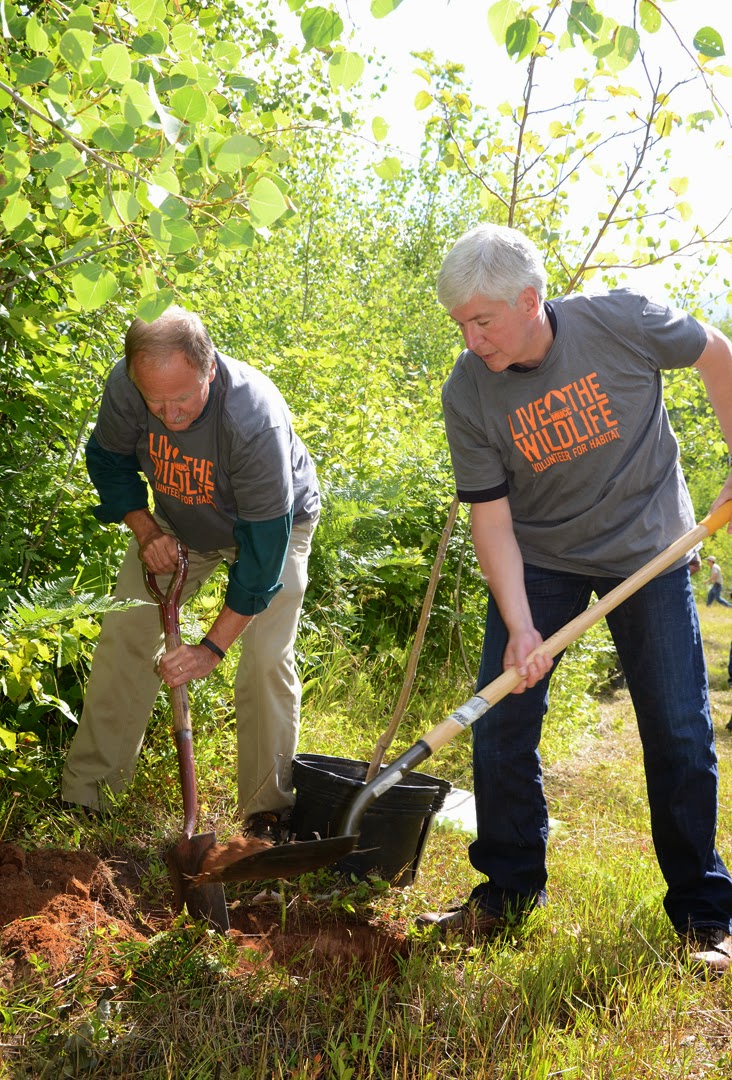By IAN K. KULLGREN

DNR Director Keith Creagh and Gov. Rick Snyder assisted volunteers in planting more than 75 fruit-trees and shrubs to enhance a new hunter walking trail in southern Marquette County Aug. 13. Image: Michigan Department of Natural Resources
The Michigan Department of Natural Resources (DNR) is providing incentives to private landowners and launch other initiatives to restore hunting habitats.
The programs, funded by recent increases to hunting and fishing license fees, are intended to rejuvenate land for hunting while maintaining a healthy game population.
In the Upper Peninsula and Alpena area, for example, DNR officials are working with landowners to plant trees and small brush to lure deer to popular hunting areas, part of an effort to “create world-class hunting opportunities” in the state, according to the department.
In the U.P., an estimated 22,000 trees and shrubs were planted last summer as part of that effort.
The DNR’s Wildlife Division is pouring $50,000 into such efforts in the Northeast Lower Peninsula this year in response to complaints that quality hunting land is disappearing.
The DNR recently awarded wildlife habitat grants to more than a dozen conservation groups across the state, ranging from $15,000 to more than $150,000.
Among them, Huron Pines, a nonprofit based in Gaylord, received nearly $60,000 to replant native prairies and clean up abandoned oil and gas drilling pads on private land in Cheboygan County. The Presque Isle Conservation District was awarded $23,000 to build snowshoe hare shelters and plant native brush for grouse and woodcock.
About 70 percent of hunters in Michigan hunt primarily on private land, Wildlife Division Chief Russ Mason said. An estimated 80 percent of hunting land in the U.P. is owned privately.
“I could work miracles with my 20 percent and it wouldn’t move the needle,” Mason said.
Many areas, particularly in the U.P., have been plagued by beech bark disease and the invasive emerald ash borer, killing trees in areas once teeming with deer.
Some of the money will be used to fund winter yards, places with food to help deer weather the cold winter months.
The changes are funded by higher license fees that took effect March 1, the first increase since 1996. Michigan residents are now required to buy an annual $11 base license in addition to other specific licenses, such as a $20 deer license. Previously, residents needed only an individual license, which was $5 cheaper.
“Do I like paying more? No,” said Bruce Levey, a Michigan Bow Hunters board member. “But is it necessary? Sure it’s necessary.
“The habitat work they’re doing, it affects all the animals,” Levey said.
The DNR also wants to double the pheasant population in the Lower Peninsula. Pheasants are becoming scarcer as more farmers cut down wooded areas on their properties and don’t leave their fields fallow. Plans include adding more walking trails for grouse and woodcock hunting.
The restoration project is targeting public and private land in ten counties, including Lenawee, Emmet, Ionia and Allegan.
In addition, the department is building bridges and bird hunting platforms at Shiawassee River State Game Area and improving goose habitat in the U.P. at Baraga Plains and Sturgeon River Sloughs.
“There’s an awful lot of private land in Michigan, and people really don’t know how to manage the natural resources,” said Dean Hall, president of the Michigan Bow Hunters.
“The thing that we demand from the Department of Natural Resources is that hunters, fishers and trappers get value for their dollars. There’s a ton of stuff that has been happening so far, and it’s only in the early stages, so we’re going to keep a finger on the pulse and a watchful eye,” Hall said
